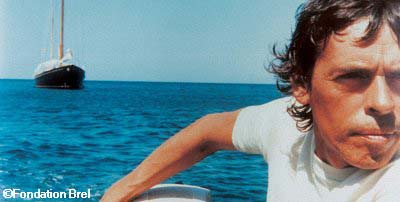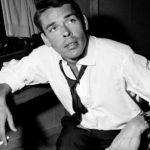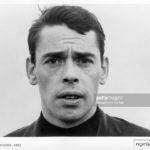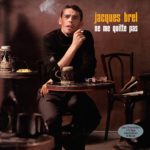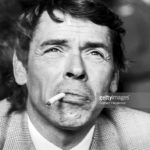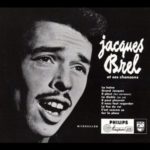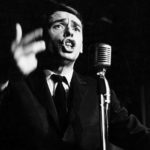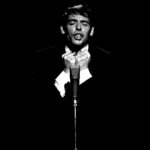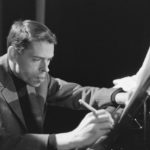Some years ago I visited the Fondation Jacques Brel in Brussels, founded by one of the great singer’s daughters. This was a sort of homage to a hero, though by no means a conventional hero – the sort of singer whose music you learned to love and can’t forget. He led a fascinating if short life too, but his legacy lies in the music.
I got to know the songs of Jacques Brel many years ago, at a time when the great chanteur was going through a revival in France and his native Belgium, but was deeply unfashionable in the UK, this being the period of punk and then New Wave. I say that, but it was always a surprise for friends to find a whole host of songs they had assumed were written in English were actually translations from or reimaginings of songs originally written in French by Brel – and boy, were there examples.
David Bowie did a version of Amsterdam as the b-side to his single Sorrow; Terry Jacks got to no 1 with Seasons in the Sun, which as it turns out was a happy-clappy lyric added to a much darker Brel song originally called Le Moribund; and who could forget the memorable Alex Harvey performing Next with SAHB on The Old Grey Whistle Test, a brilliant translation of the mood of Brel’s Au Suivant – and these are just a few examples, though the best moment was seeing the man himself singing his classic sad yet chanson Ne Me Quitte Pas in an otherwise unrelated film.
Best covers are linked here. Although there were many examples from great performers, Brel’s music was translated and brought into popular attention the UK and American by Scott Walker, whose album Scott Walker Sings Jacques Brel certainly inspired a cult following for a man who was at the time fairly obscure over here, while being a massive star the other side of the Channel.
Why should that be, you may wonder? Fact is that Brel refused to sing in English (unlike Piaf, for example), and rarely visited London. He was however fascinated with the Pacific Oceans and sailed his yacht to the southern seas after retiring from stage performances, something, like Sinatra, he did numerous times. Brel was buried in French Polynesia following his death from lung cancer in 1978 at the age of 49 – a few yards from the artist Gauguin.
The fascination with Brel’s music and personality repays some analysis. He was not the greatest singer or musician you’ll ever hear, though his work with François Rauber and several orchestras, notably that of Gérard Jouannest, provided the backdrop against which Brel could perform his greatest songs.
There’s no doubt he was a brilliant songwriter, specialising in dark and sometimes morbid lyrics that tell stories – a far cry from the shallow “baby I love you” school so popular with record labels in England in the 60s – thus making it unlikely. Brel would mostly create characters rather than singing with his own voice, as it were. Typically they went places songs rarely went; they were at various times moody, pointed, humorous, jaunty, ambiguous, passionate, wistful and melodramatic – but always engaging, and often went places conventional songs simply did not go.
Rarely do they translate well into English – you have to listen to them in French to appreciate the poetry. For example, two lines at the end of Amsterdam are translated literally into the best English thus:
And they piss like I cry
On our unfaithful wives.
The original reads:
Et ils pissent comme je pleure
Sur les femmes infidèles
Trust me here, there is no contest – the French is poetic by comparison!
While Brel’s songs were brilliant, what sealed his reputation was the charismatic way he performed them, acting out the drama and signing with a passion rarely seen then or now. He could sing slow, soft and sweet, but the characteristic most listeners would associate with Brel’s songs is his ability to sing at a truly breakneck speed without losing any clarity. The best example is La Valse À Mille Temps, which begins slowly and picks up pace throughout until you can barely keep up listening, let alone singing or dancing.
Live recorded performances are few and far between, but the buzz created by Brel’s electrifying shows meant that he filled the Olympia in Paris on many occasions, and indeed everywhere he went around France and Europe. The only cover singer getting close to the Brel personality in performance is, in my view, the late great Alex Harvey.
In addition to the concerts he performed in several films towards the end of his career, and indeed brought Man of La Mancha to Paris in a French translation that included Brel’s dramatic version of Impossible Dream, translated as La Qûete.
While there is a tendency for some Brel songs to verge on what was once detrimentally known as “easy listening” many more are still edgy and thrilling to this day – many make the hairs on the back of my neck stand on end to this day.
As I age and mellow though, I probably tend more towards some of the more nostalgic numbers. Mon Enfance, a journey through Brel’s memories of his Flemish childhood, brings me back to my upbringing in Coventry and Wilmslow; his achingly beautiful Chanson Des Vieux Amants says all you could want to know about a long affair between two ageing lovers; the whirling accordion accompaniment to Vesoul sounds funky 50 years on; and just to demonstrate he could do conventional love songs when he wanted to, Les Coeurs Tendres is certainly charming.
Of course, these are just a small sample. If you’re not familiar with the work of Brel, it’s certainly worth a punt, and chances are you will find some songs that appeal. After all, he is an incredible influence over popular music, especially but not exclusively French, even now, by virtue of allowing artists to innovate and do things that at one time simply would not have been conceivable in the music industry. As such, you might regard Brel as doing to the staid and conventional world of the 50s and 60s chansonnière what punk did to pop music in the late 70s and early 80s.

